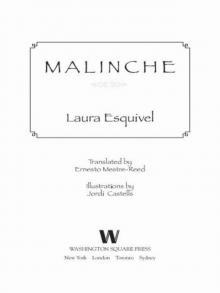- Home
- Laura Esquivel
[2013] Pierced by the Sun Page 8
[2013] Pierced by the Sun Read online
Page 8
Lupita left the world for a moment. She didn’t hear sirens approaching the rehab facility. She didn’t see gunmen run past her. The only thing she was sure of was that an invisible thread had emerged from her heart and had risen to the sky where it connected with the heart of the heavens. It was so powerful that everything happening around her faded into the background. She didn’t notice a gunman stop in front of her and shoot, and she didn’t realize that the IV stand saved her life when it blocked the bullet. She did hear the gun being fired, however. Alarmed, she opened her eyes and saw Tenoch—a man with ear gauges and a labret piercing—pull her away from her attacker’s aggression. He took her in his arms and led her away from the scene, which rapidly evolved into chaos.
Lupita offered no resistance and meekly let Tenoch guide her. This man was the only person she could trust.
LUPITA LIKED TO SOW
To touch the earth. To walk barefoot on it. To water it. To smell it. Nothing compared to the feeling she got from the scent of wet soil. She liked to walk across the fields at dawn to see how much her plants had grown during the night. Sometimes she liked to wander through the sown fields at night and listen carefully for the sound of the plants as they grew. Lupita could even hear the cracking of a seed in the ground as it gave way to a new sprout. No one believed it, and she hadn’t spoken of it for years. Her mother’s family had migrated from the country, and during childhood summers she visited the relatives that had stayed behind at their farm, where she contributed to the daily labor. Forces outside of her control had made her a city mouse, but if she could have chosen she definitely would have lived in the country.
Because of her family history she had no trouble adapting to life in an indigenous community nestled within the mountainous state of Guerrero. Or at least that’s where she had been told she was. Her exact location was a mystery, but it didn’t concern her in the slightest. She remembered spending hours in the back of a vehicle driven by her silent savior, the man who’d rescued her off the street but hadn’t uttered a word during their entire journey. She only knew his name: Tenoch. Lupita had stared at his unusual piercings, which matched the description she had given her superiors for the suspect’s sketch. Was it a coincidence? Or had Lupita become a magnet for these kinds of people? Her discomfort was greater than her curiosity, so she decided to keep quiet and lie down in the backseat with her eyes closed. The vibration of the car indicated that they had been on a highway for a long time before driving along a dirt road. She wouldn’t have wished that on her worst enemy. The pain in her leg and ribs got worse with every bump. Finally, at dawn, they reached their destination. Tenoch killed the engine, got out of the car, opened the back door, and offered Lupita his hand.
“Where are we?” asked Lupita.
“In a safe place.”
Lupita tried to observe her surroundings, but thick fog didn’t let her see more than two feet. A pack of dogs barked. An indigenous woman came out of a hut and walked toward them with a sarape in her hand. She wrapped Lupita in it and gently led her to another cabin, where a cot was waiting for her. A few moments later another woman came in and offered Lupita a cup of tea. Lupita drank it, lay back, and immediately fell asleep. Later on, the cold woke her. She tried to search for covers and the cot creaked.
“Are you cold?” asked a woman’s voice.
“Yes.”
“We’ll get you a cup of coffee.”
Lupita could see nothing in the darkness. When the light of day finally came through the cracks of the wooden hut’s walls Lupita learned that she had shared the space with three other women who had already begun to get ready. One ground corn for the tortillas. Another lit a fire and made coffee for everyone. The third left to get eggs for breakfast.
From the day she arrived these women showered Lupita with attention and care. They offered her everything they had without hesitation. She never felt like an outsider. The smell of the fresh handmade tortillas sparked her appetite. Lupita happily ate a scrambled egg and a couple of tortillas, and drank a cup of coffee. Later on she would learn that she had been fed an egg because of her delicate health, but the community could not always afford the luxury of eating eggs for breakfast.
Women and children composed the community. Tenoch—the man who had brought her there—had disappeared the day after their arrival and had not been seen again. The women of the community were perfectly organized and were very hard workers. Lupita once asked about the men and was told they either had migrated or were employed by drug cartels. Because of this, the majority of the population were women, children, and elders.
“And where are the men who work for the cartels?” asked Lupita.
“Who cares? We don’t want them here; they endanger us.”
The women told Lupita that one day, tired of living in anxiety, they spoke to the Council of Elders and they all decided they would no longer tolerate hit men, drug traffickers, and addicts. It was decided that anyone who violated these terms and affected the community would be banned forever.
“They just up and left?”
“No, of course not. We had to put up a fight, and the community police from Paraíso helped us out.”
“What do you mean community police? How does that work?”
“They’re all indigenous like us and they want the same things we do. They receive no salary for their work, and they risk their lives defending us from abuse, from the government, the federal police, the army, and the cartels. They have taught us to organize with our own resources and to protect our own, as they have done for over eighteen years. They were also sick of so much death in their town and the cartels’ way of ruling, so they gathered their grandparents’ rifles from the Revolution and they killed the narcos.”
“Just like that?”
“What other way is there? Dead dogs don’t bite.”
“But there’s a lot of rabid dogs out there, and they’re well organized,” Lupita said.
“You’re right, and it’s not easy. Hit men come every once in a while to scare us into planting their drugs, but when we see them approaching we ask for help and the community police always come.”
“To kill them all, I assume.”
“Correct.”
“That’s kind of rough, don’t you think?”
“What they do is worse. Look ma’am, those narcos that mutilate, torture, and kill others are no longer a part of us. They’re no longer part of any family or community; they act against everyone. They are worth nothing. But when you bury a narco, you allow him to be a part of you again. He becomes dust, food, our brother once more. His body—dissolved in the earth—now sustains life again, instead of destroying it.”
ALCOHOLISM IN ANCIENT MEXICO
Before the arrival of the Spaniards to what is now considered Mexico, alcoholism was not a health issue among the indigenous population. Its consumption was heavily regulated. The ingestion of pulque, the fermented drink distilled from the maguey cactus, was only allowed for people older than fifty-two and elite priests during special ceremonies. Regular citizens could only drink it during the holidays. Public inebriation was severely punished. If someone acted drunk in public they risked being beaten to death. In the pre-Hispanic peoples’ cosmogony—in which every life has a purpose—alcoholics deserved death because they had surrendered their will to the wrong deity, which became an impediment for the fulfillment of their plan. The only ones allowed to drink without restriction were those whose active lives were over and thus would not become a burden on society or a hindrance to the cosmic order.
In the first recorded governmental speech to the people, alcoholic beverages were referred to as “the beginning of all evil and perdition, because octli [pulque in the Náhuatl tongue] is like an infernal tempest that unites all evil. From drunkenness come robbery, theft, and violence . . . the drunkard finds no rest in peace and quiet. Their mouths do not speak peaceful or temperate words. The drunkard is the destruction of public peace.”
Lupita remained in
silence after what she had heard. Nobody had ever said anything similar to her before. This concept of life and death called for reflection. She wondered what Carmela—the woman who had been explaining everything—would think of her if she found out Lupita was an alcoholic who cared for no one else when she was inebriated.
“The man who brought me here, is he part of the community police?” Lupita asked.
“Tenoch? No way! He’s our shaman; he heals and protects our souls,” said Carmela.
“So where is he?”
“In the capital. He has great work to do there, and we have a lot of work to do here, so excuse me, I need to leave for the field.”
“Yes, please, go. Wait, how do you communicate when you need to call for help? My phone is dead and I need to make a call.”
“You’ll have to wait for the shaman or his mother, who is also a shaman. They will come back for a baptism in a couple of weeks and they have a cell phone.”
Lupita pondered the conversation. She knew about the good work that the community police in Guerrero had been doing. She also knew that they had tried to be recognized by the authorities for years so that they could guard their communities and uphold justice according to their own traditions. But she had never heard of it firsthand. The police she knew of mostly protected criminals and dishonest politicians. Very rarely did they care about normal citizens. Lupita wished she were part of the community police, to serve others and risk her life for a greater cause. She felt that by leaving her police uniform behind at home she had left behind the negative aspect of her job and was remembering the true purpose that had driven her to become a policewoman.
Lupita wanted to tell these women that she was a police officer and could help protect the community. She wanted to show gratitude for their kindness and generosity, but now wasn’t the right time. In her present state she couldn’t even defend an ant. First she had to mend her physical condition and heal the most sensitive—and damaged—part of her being. Also, she liked the idea of living in anonymity. These women knew nothing about her; they didn’t judge or reject her. They knew nothing of her past so they could not reproach her. For them she was an ordinary woman who needed help, and they obliged generously. What was surprising was that they cared for her without neglecting their duties. Their community was organized under the structure of tequio, in which every inhabitant of the community contributes to the well-being of the group through work. It was a genuinely positive form of collaboration. No one expected compensation other than the satisfaction of elevating the quality of life for every single member of the community.
That same structure guaranteed the efficiency of the community police. It was the exact opposite of the political and work environments Lupita had known her whole life, where nobody ever volunteered for anything or shared without expecting something in return. It was obvious that a tremendous social decay had permeated political parties and government offices in Mexico’s capital. But in this place—away from “civilization”—all she witnessed from the moment she opened her eyes until she closed them at night was the overwhelming beauty of a mountain range that was blanketed by fog at night and completely uncovered in the morning. It was a spectacle of such beauty that it moved Lupita to tears. She considered it a privilege to watch from her cot the magic moment in which the mist dispersed and the mountains appeared.
Nature, along with the generous gestures of the indigenous women, finally allowed Lupita to comprehend the idea of a superior power, a supreme energy that organized the movement of the stars, that regulated ecosystems and that—among many other things—synchronized the cycles of women with the cycles of the moon.
Lupita’s soul healed day by day, as did her broken bones. When her leg was strong enough to support her she liked to take night strolls through the moonlit fields. Even though it was night she wore a broad hat because she had heard from her grandmother that moonlight is just as powerful as sunlight, and one should take precautions before being exposed to it. She liked knowing that from the darkness of the soil, life could erupt. That even though she couldn’t see them in plain sight, there were seeds that germinated, opened, grew, and would become a part of us. There are things that can’t be seen but exist nonetheless.
Just as congressmen and senators had taken advantage of the darkness of dawn to hastily approve reforms and come to infamous, cowardly, and ignominious agreements that would hand over her country’s natural resources to foreign entities, Lupita learned that there was another Mexico where new seeds were being sown, seeds that were still invisible but would soon bear fruit to new ideas, new organizations, a new sense of community.
As the days passed Lupita felt less need to speak to Celia or Captain Martinez. Insisting was of no use. Her phone’s battery was long dead, and there was no way to charge it. That was that. So she fully immersed herself in the lessons that isolation was giving her. One of the greatest benefits of this isolation was that it calmed her consumerist anxiety. People in big cities enter a vortex of consumption even without wanting to: the newest smartphone, the newest iPad, the newest sound system, the newest way to stream movies, the newest microwave oven. It took longer to acquire these products than for them to be replaced by a new model. In the face of the inability to acquire new devices, people lived in a constant state of dissatisfaction. Now she realized that she really didn’t give a rat’s ass if she owned the smartest phone.
Lupita also learned to enjoy the new things that nature offered, things that required no purchase. The newest sunset, the newest shoots of a tree, the first drop of dew. Everything was novel. Everything changed day to day. Everything transformed, free of charge.
After twenty-one days of this emotional cleansing—of not reading newspapers, of not being aware of the government’s treacheries, of not bearing witness to death—Lupita felt part of a spirit that envelops everything, that renews everything. And just as the mist disappeared in the mornings among the tall mountains, so did the dense shroud of sadness disperse from Lupita’s heart.
LUPITA LIKED TO PROTECT
Maybe that was why she became a policewoman. It gave her great satisfaction to help out in an emergency, to provide support, to care for and comfort others.
In the building where she grew up her friends always had asked her to defend them. Celia was the one who most often had come to her for help. Celia was three years younger than Lupita and had been a small and skittish girl. She was terrified of Doña Toña’s turkeys, which were often loose and unattended in the building’s courtyard, and would peck the girls when they were playing. As soon as Lupita saw the turkeys get agitated she used her body as a shield to protect Celia.
A smile formed on Lupita’s lips. It had been so long since she’d reminisced about her childhood games! Sometimes it was even hard for her to remember that she had once been a happy girl. Lupita had laughed contagiously, and when they were girls, Celia and she often fell into fits of laughter. If Doña Trini was around, she would say, “Stop laughing so much, you look stupid.” That would only make them laugh harder. They laughed so much together! As Lupita grew she lost that childish joy, but she kept her vigorous laughter. No one could hear her laugh without joining in. Of course, her best echo always came from Celia. So they faced the turkeys many times, just for laughs. These acts of courage had resulted in innumerable pecks, but she never wavered. The satisfaction Lupita had gotten from providing protection to friends and neighbors was greater than the pain in her legs from the pecking.
Life in the community had been calm even though the rest of the state of Guerrero was in turmoil. Lupita was now completely assimilated to her new life. She loved to be awakened by the roosters and to hear the birds sing and chirp during her morning activities, especially a flock that flew out of a cave when the first rays of sunlight hit the sky. To rise with the sun and to go to bed early after a long day of hard work was a blessing. Her broken leg was healing quite well. Her rib did not hurt anymore, and it had only been twenty-one days since her arrival. She w
as completely adapted. An outside observer would not have detected a difference between her and the rest of the women in the community. Lupita braided her hair like them and shared their features and skin color, although she was not as tan from the sun.
On this particular morning, Lupita could say she felt happy. She was using a jícara to take a bath next to Carmela in a small shack that served as an outdoor shower. Carmela was helping Lupita cover the cast on her leg so it wouldn’t get wet. From outside of the shack they could hear the everyday sounds: children playing, chickens clucking, dogs barking.
But Lupita became alert because the dogs were barking louder than usual. She remembered the day she had arrived.
“Hey Carmela, do you think Tenoch is back?”
“Maybe. We were expecting him yesterday.”
Lupita remained vigilant. She was half-dressed when she heard the dogs bark again and the sounds of people running and yelling. The two women held their breath as Lupita peeked through the shack’s wooden planks. She saw several men indiscriminately hitting the women and children that were blocking the entrance to the community. Lupita felt her blood boil. She couldn’t stand to watch anyone use violence against civilians. She got dressed in a hurry and silently exited the shack without being seen by the attackers.
This group of five armed men had fled from a town in the state of Michoacán, where they had been involved in a shoot-out against an Autodefensa group. Autodefensa groups were different from the community police, but they also emerged from the people’s need to defend themselves against organized crime’s constant bullying and demands for payoffs—and the constant kidnappings, rapes, and homicides—since the official police were never of any help and often colluded with the narcos. Several Autodefensa groups had been expanding and taking over towns in Michoacán, recovering control of their lands and participating in the election of their authorities. Many of these groups were inspired by the Zapatista movement, which had achieved a great deal in its twenty years of existence. To begin with, Autodefensa groups worked their own lands and were self-sufficient. They now controlled twenty-seven autonomous municipalities in which alcohol and other drugs were banned. Justice was carried out in their territories without government interference. Women were respected, occupied important positions, and took on hard-earned responsibilities. Within the territories they occupied, Autodefensa groups were the law and decided their own destiny.

 Like Water for Chocolate
Like Water for Chocolate Malinche
Malinche Pierced by the Sun
Pierced by the Sun Swift as Desire
Swift as Desire![[2013] Pierced by the Sun Read online](http://i1.bookreadfree.com/i2/04/10/2013_pierced_by_the_sun_preview.jpg) [2013] Pierced by the Sun
[2013] Pierced by the Sun